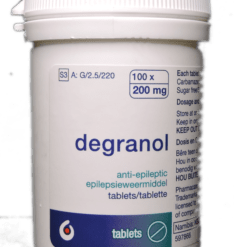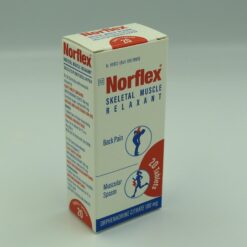Pain is an unpleasant sensation that can range from mild discomfort to severe agony. It is typically caused by the activation of nociceptors in the body, which are specialized sensory receptors that respond to tissue damage or inflammation. Pain can be acute, meaning it is sudden and short-lived, or chronic, lasting for weeks, months, or even years. It can be caused by a wide range of factors, including injury, disease, inflammation, or psychological factors.
Degranol (Carbamazepine) 200mg/30tabs is a medication commonly prescribed to manage certain types of seizures, like epilepsy. It can also be used to alleviate nerve pain and treat bipolar disorder. This formulation comes in a pack of 30 tablets, each containing 200mg of the active ingredient, Carbamazepine. It works by stabilizing electrical activity in the brain, helping to control seizures and manage mood disorders.
Ibugesic Forte is a nonsteroidal anti-inflammatory drug (NSAID) that is used to relieve pain and inflammation. It is a combination of ibuprofen and paracetamol, which are both effective painkillers and antipyretics. Ibuprofen also has anti-inflammatory properties.
Ibugesic Forte is used to treat a variety of conditions, including:
- Headaches
- Migraines
- Toothaches
- Muscle aches
- Backaches
- Menstrual cramps
- Arthritis
- Fever
Ibugesic Forte is generally safe and well-tolerated, but it can cause side effects in some people. The most common side effects are mild and go away on their own. However, more serious side effects can occur, such as stomach bleeding and ulcers.
Ibugesic Plus is a combination medication that contains two active ingredients: ibuprofen and paracetamol. Ibuprofen is a nonsteroidal anti-inflammatory drug (NSAID) that reduces pain and inflammation. Paracetamol is an analgesic (pain reliever) and antipyretic (fever reducer).
Ibugesic Plus is used to treat a variety of conditions, including:
- Headache
- Migraine
- Backache
- Muscle pain
- Period pain
- Dental pain
- Fever
Myprodol is a combination analgesic medication that contains ibuprofen, paracetamol, and codeine. It is used to treat mild to moderate pain of inflammatory origin, with or without fever. * Ibuprofen is a non-steroidal anti-inflammatory drug (NSAID) that works by reducing inflammation and pain. * Paracetamol is an analgesic and antipyretic that works by blocking pain signals and reducing body temperature. * Codeine is an opioid analgesic that works by binding to opioid receptors in the brain and spinal cord to reduce pain. Myprodol is available in capsule form and is taken orally. It is important to follow the dosage instructions on the label or as directed by your doctor. Do not exceed the recommended dose. Myprodol is generally safe and well-tolerated when taken as directed. However, it can cause side effects such as nausea, vomiting, constipation, dizziness, and drowsiness. More serious side effects can occur, but are rare.
Myprodol is a combination analgesic medication that contains ibuprofen, paracetamol, and codeine. It is used to treat mild to moderate pain of inflammatory origin, with or without fever.
- Ibuprofen is a non-steroidal anti-inflammatory drug (NSAID) that works by reducing inflammation and pain.
- Paracetamol is an analgesic and antipyretic that works by blocking pain signals and reducing body temperature.
- Codeine is an opioid analgesic that works by binding to opioid receptors in the brain and spinal cord to reduce pain.
Myprodol is available in capsule form and is taken orally. It is important to follow the dosage instructions on the label or as directed by your doctor. Do not exceed the recommended dose.
Myprodol is generally safe and well-tolerated when taken as directed. However, it can cause side effects such as nausea, vomiting, constipation, dizziness, and drowsiness. More serious side effects can occur, but are rare.
Myprodol Tablets are a combination analgesic medication that contains ibuprofen, paracetamol, and codeine phosphate. It is used to relieve mild to moderate pain of inflammatory origin, with or without fever.
- Ibuprofen is a non-steroidal anti-inflammatory drug (NSAID) that works by reducing inflammation and swelling.
- Paracetamol is an analgesic that works by blocking pain signals from being sent to the brain.
- Codeine phosphate is an opioid analgesic that works by blocking pain signals in the brain and spinal cord.
Myprodol Tablets are a prescription medication and should be taken as directed by your doctor. The usual dose for adults and children over the age of 12 years is one to two tablets four to six hourly, not exceeding six tablets per day.
Myprodol Tablets can cause side effects such as nausea, vomiting, constipation, and drowsiness. It is important to take Myprodol Tablets with food to reduce the risk of stomach upset. You should also avoid drinking alcohol while taking Myprodol Tablets, as this can increase the risk of side effects.
Myprodol is a combination medication that contains ibuprofen, paracetamol, and codeine. It is used to relieve moderate to severe pain, such as headache, toothache, menstrual cramps, muscle aches, and back pain. It is taken orally with a full glass of water, and the recommended dosage for adults is two tablets taken every six hours as needed for pain relief, up to a maximum of 8 tablets per day. Common side effects may include dizziness, drowsiness, nausea, and constipation. Patients should always consult their doctor or pharmacist before taking Myprodol or any new medication.
Myprodol Tablets are a combination analgesic medication that contains ibuprofen, paracetamol, and codeine phosphate. It is used to relieve mild to moderate pain of inflammatory origin, with or without fever.
- Ibuprofen is a non-steroidal anti-inflammatory drug (NSAID) that works by reducing inflammation and swelling.
- Paracetamol is an analgesic that works by blocking pain signals from being sent to the brain.
- Codeine phosphate is an opioid analgesic that works by blocking pain signals in the brain and spinal cord.
Myprodol Tablets are a prescription medication and should be taken as directed by your doctor. The usual dose for adults and children over the age of 12 years is one to two tablets four to six hourly, not exceeding six tablets per day.
Myprodol Tablets can cause side effects such as nausea, vomiting, constipation, and drowsiness. It is important to take Myprodol Tablets with food to reduce the risk of stomach upset. You should also avoid drinking alcohol while taking Myprodol Tablets, as this can increase the risk of side effects.
Nurika (150mg capsule) is a brand name for the generic drug pregabalin. It is a prescription medication used to treat a variety of conditions, including:
- Neuropathic pain caused by nerve damage from diabetes, shingles, or spinal cord injury
- Fibromyalgia (chronic pain all over the body)
- Partial onset seizures in adults
Pregabalin is thought to work by reducing the activity of certain chemicals in the brain that play a role in pain and seizures.
Nurika (150mg capsule) is taken by mouth, usually two or three times a day. The dosage will vary depending on the condition being treated and the individual's response to the medication.
Common side effects of Nurika (150mg capsule) include dizziness, drowsiness, blurred vision, dry mouth, and weight gain. More serious side effects can occur, such as allergic reactions, suicidal thoughts, and seizures.
Nurika (150mg capsule) should not be taken by people who are allergic to pregabalin or other anticonvulsant medications. It should also not be taken by people with kidney problems or a history of drug or alcohol abuse.
It is important to talk to your doctor before taking Nurika (150mg capsule) to discuss the risks and benefits of the medication.
Nurika (25mg capsule) is a brand-name prescription medication that contains the active ingredient pregabalin. It is used to treat:
- Neuropathic pain caused by damaged nerves due to diabetes, shingles, or spinal cord injury
- Fibromyalgia (pain all over your body)
- Partial onset seizures in adults and children
Nurika works by reducing the amount of pain signals sent by the nerves to the brain. It is a controlled substance, so it is important to take it exactly as prescribed by your doctor.
Common side effects of Nurika include dizziness, drowsiness, blurred vision, and dry mouth. More serious side effects can occur, such as suicidal thoughts, swelling of the hands and feet, and difficulty breathing.
Nurika (150mg capsule) is a brand name for the generic drug pregabalin. It is a prescription medication used to treat a variety of conditions, including:
- Neuropathic pain caused by nerve damage from diabetes, shingles, or spinal cord injury
- Fibromyalgia (chronic pain all over the body)
- Partial onset seizures in adults
Pregabalin is thought to work by reducing the activity of certain chemicals in the brain that play a role in pain and seizures.
Nurika (150mg capsule) is taken by mouth, usually two or three times a day. The dosage will vary depending on the condition being treated and the individual's response to the medication.
Common side effects of Nurika (150mg capsule) include dizziness, drowsiness, blurred vision, dry mouth, and weight gain. More serious side effects can occur, such as allergic reactions, suicidal thoughts, and seizures.
Nurika (150mg capsule) should not be taken by people who are allergic to pregabalin or other anticonvulsant medications. It should also not be taken by people with kidney problems or a history of drug or alcohol abuse.
It is important to talk to your doctor before taking Nurika (150mg capsule) to discuss the risks and benefits of the medication.


